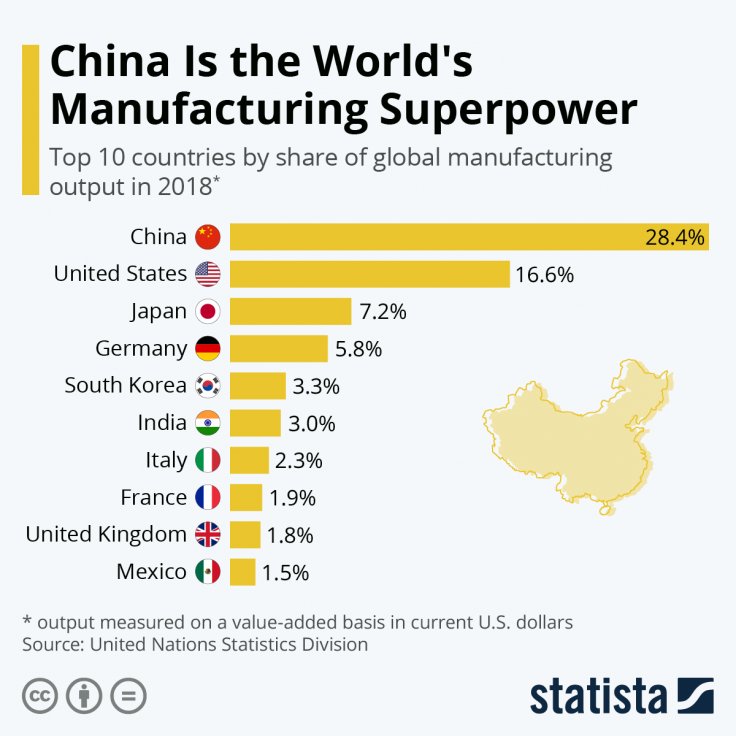For the last two decades, China has managed to establish itself as the go-to place for manufacturing. The Asian country has often used its position in the world to exert its political hegemony. But with Coronavirus pandemic and its expansionist moves in border areas and the South China Sea, many countries have started distancing themselves from China.
Especially with the lockdowns due to the COVID-19 pandemic, as China shut down factories, the over-reliance on its manufacturing base was exposed. But it has also been a wake-up call for European countries and the U.S. as relocating from China has suddenly appeared on their agenda.
It has offered a unique opportunity to other Asian nations to become an alternate manufacturing base, especially with the U.S. Government urging and often forcing American companies to move away from China. Singapore, which is celebrating its 55th National Day on August 9, can lead the way to become the next hub while India, Japan and ASEAN (Association of Southeast Asian Nations) countries including Vietnam have the potential to take a big chunk away from China.

Singapore's Potential
Singapore with its technology, an already established manufacturing base, and international seaport has the best opportunity to establish itself as a global hub. The city-state till the 1990s had the manufacturing base that could rival that of Taiwan and South Korea but over the last three decades China's emergence has shifted even Singapore's focus.
Former Singapore Member of Parliament, Inderjit Singh in his opinion piece for South China Morning Post said that once manufacturing contributed to 30 percent of Singapore GDP but now it has come down to just 19. That has also reflected in employment. While 25 percent of Singaporeans relied on manufacturing jobs in 1994, now it is 13 percent.
The Republic still has a skilled workforce in manufacturing besides its technical universities' capability to produce a skilled workforce. Now, with unemployment soaring due to the worldwide recession as a result of lockdowns due to the Coronavirus pandemic, the country would need to look at alternate options and the manufacturing sector offers the best hope.

Unique Position
If not the world hub, Singapore can certainly cater to the ASEAN region, which has around 135 million middle-class consumers and it is expected to grow by 51 percent by 2030. As former Singapore Prime Minister Goh Chok Tong envisioned, the city-state can look beyond the Growth Triangle of Singapore-Malaysia-Indonesia to become a growth corridor for Southeast Asia, as per Singh.
Vietnam, Indonesia, and Thailand are already taking the opportunity seriously, developing their own mass production and assembly bases. Singapore's current PM Lee Hsien Loong in his National Day speech said the citizens must be resilient in fighting the economic crisis and the Government will help through the Job Support Scheme, which can also include training for the manufacturing sector.
"Singaporeans are understandably anxious and worried. Business closures, retrenchments and unemployment are all likely to go up in the coming months," he said, adding that the National Trade Union Congress (NTUC) is already working with employers to establish job training programs.

Intellectual Property
According to Singh, Singapore's other big strength is intellectual property (IP). The country has invested $44 billion since 1991 in Research, Innovation and Enterprise funding that has created marketable applications and new start-ups. As per the Global Innovation Policy Center, Singapore ranks 11th in overall economy score in the IP index while tops in patents.
That will help in converting the IPs to products and jobs. Besides, Singapore's state-owned venture builder, Temasek Foundation, has had a lot of success in growing companies like SingTel, DBS and other companies. If such entities grow in number, acquiring stakes in foreign companies like China has done, it will help Singapore become the regional power.
In terms of political stability, Singapore probably is best known for that. Its ruling People's Action Party has ruled since its independence in 1965 and although it has seen a reduction in votes share, it is still growing strong. The country has strong diplomatic relations with countries like the U.S., U.K., India, and even China to establish itself as a regional power. All that combined, Singapore is best placed to be the next manufacturing hub, reducing over-reliance on China.








